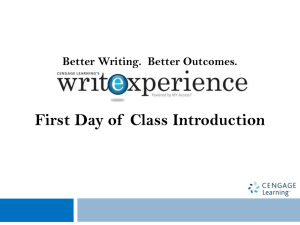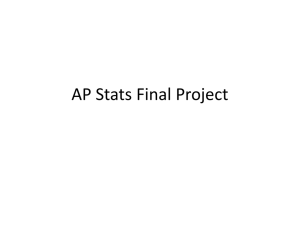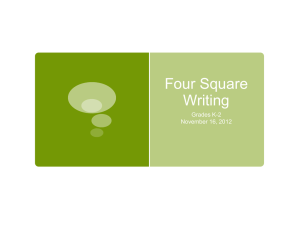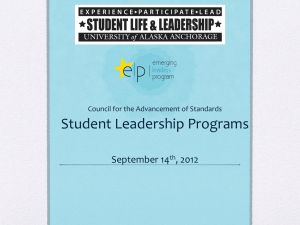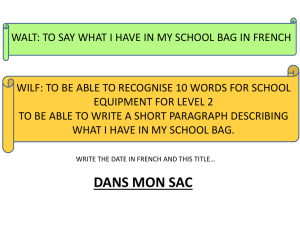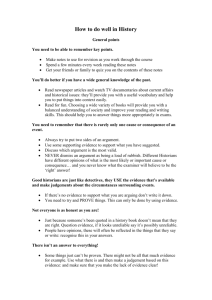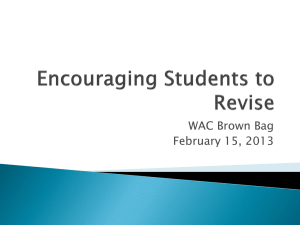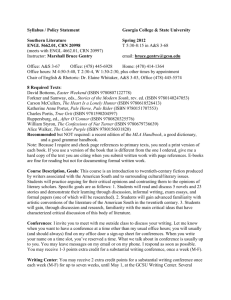International Writers` Workshop Week 8 – Revision
advertisement
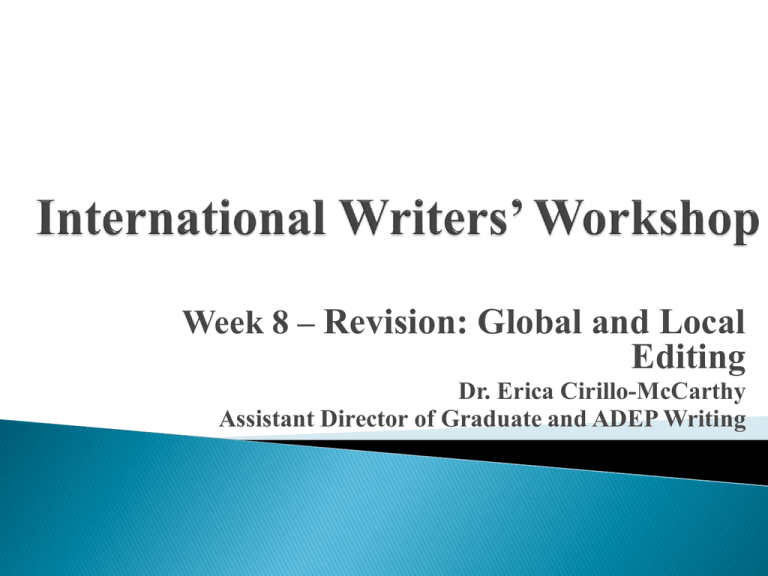
Week 8 – Revision: Global and Local Editing Dr. Erica Cirillo-McCarthy Assistant Director of Graduate and ADEP Writing Invention Drafting Revision Editing ◦ Today we will focus on the last two steps To Re-See your text To Re-Visit your ideas A time to improve your ideas, to clarify your arguments, to strengthen your evidence, to solidify your academic voice First is the global revision where we look at the larger issues in the text Then and only then will you focus on the local revision which entails close line-editing and proofreading Always start with the global issues – usually your ideas, arguments, support, organization, and voice/tone ◦ Thesis or main argument or main purpose The reason behind your text ◦ Go over each section carefully Does the text follow the parameters of the assignment sheet? Are the section headers appropriate? Do they give the reader enough information and prepare them for what’s ahead? Is there continuity in the headers? Does the organization flow logically? ◦ Go over each paragraph carefully Look at each topic sentence. Does it give the reader an idea of what the paragraph will cover? What the paragraph will do? Is it in your language and not a quote? Does it connect the previous paragraph? Does it connect with the larger thesis/argument/purpose? Do a reverse outline: take the intro paragraph and the first sentence of each paragraph and cut and paste into an outline form. Do the topic sentences flow? Ask yourself – what does the audience need to know first, second, third? ◦ Print out and cut up the different paragraphs to ensure organization is optimal. ◦ Lay out the cut out paragraphs on a table. Read them aloud, then decide their order. ◦ Always consider audience – try to step out of your head when considering organization and instead consider how the audience will read your text. ◦ Remember there may be a few paths to optimal organization. Choose one, justify it, then move on. Then let the text sit while you go do something else – you want to distance yourself from the text so that you come back to it with fresh eyes. Work on something else, make dinner, call a friend, go for a walk…anything to take your mind off the text. Read your text over with a Writing Center tutor, professor, or colleague Look for the global issues – clarity, flow, support, argument or purpose, and paragraph unity You should be able to see what the process of re-seeing or re-visioning can do to your text! Global issues are the big things: big ideas, big support, big organization… Local issues are the very focused things: grammar, syntax, word choice EVERY writer has a certain number of errors that they make in their texts These errors repeat themselves throughout the texts and are often called “patterns of error” Strong writers know their pattern of errors and look for those first in the editing process Example… It could be comma splices, or verb tense agreement, or article usage Your professor and/or Writing Center tutor can help you discover your pattern of error Create a pattern of error worksheet to serve as a reference for when you draft and edit Sentence as written in your text Chinese corporations wants to engage with US investors. Sentence written without grammatical error Chinese corporations want to engage with US investors. Description and rule of error Subject/verb agreement: corporations is plural so verb must agree: want not wants (which is singular) Print out your drafts and proofread a hard copy. Research has shown that we catch things in a hard copy that we wouldn’t in an electronic copy Edit your text carefully BEFORE you visit a Writing Center tutor. Bring the tutor the questions you have AFTER you finish a close editing session on your own. In this way, you become more independent Understand that the revision process can potentially take as much time or more than the drafting process, so give yourself enough time to revise carefully and effectively! Read the hard copy aloud – to yourself, to your pet, to your roommate, to whomever will listen The trick isn’t getting them to catch your errors, but to catch them yourself (and to practice your English pronunciation) Understand that becoming a strong writer is a process – good writers aren’t born that way; they become good writers through feedback and revision, revision, revision! Questions? Thank you!

